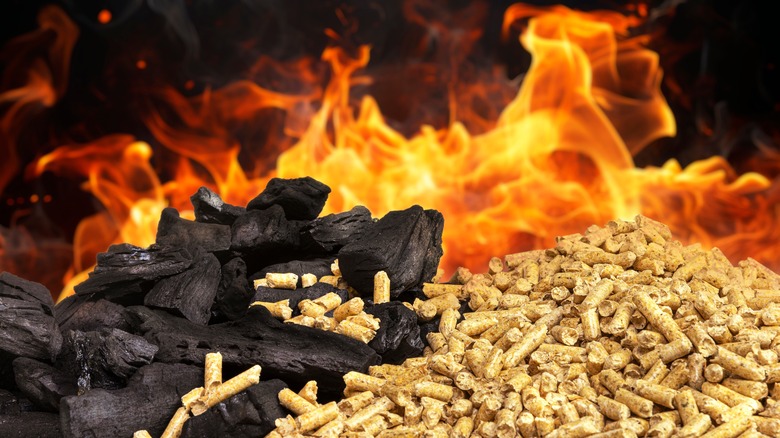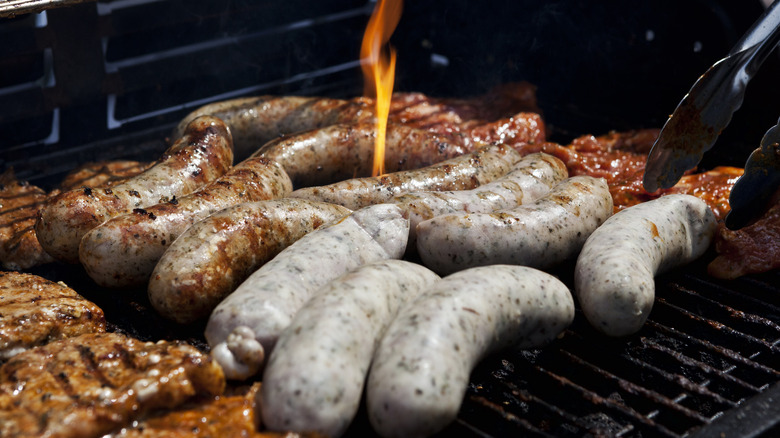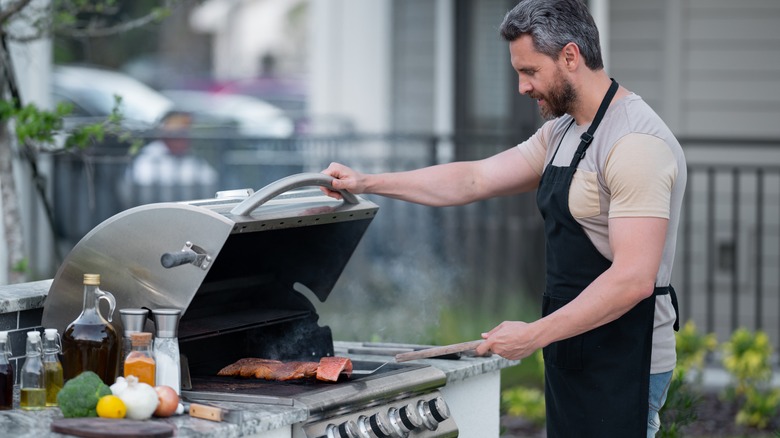How Using A Pellet Vs Charcoal Grill Affects Your Food's Taste
We may receive a commission on purchases made from links.
If you're considering getting a grill, chances are you are interested in the nuances of cooking, which also means that the pellet versus charcoal debate is one you need to consider. Your choice of fuel plays a crucial role in your cooking; not just in how you prepare the meal or the amount of effort required, but also in how it tastes.
Because of the different properties of charcoal and compressed wood pellets, they offer different levels of heat. A simple way of looking at it is that charcoal offers higher heat, but burns out faster. Conversely, pellet grills can hold temperatures more accurately and for longer durations but cannot get as hot as their charcoal-burning counterparts.
If you're getting a grill because there's a specific dish you want to make at home, figure out what kind of grill that dish is best made on. If it's a steak you want, seared and charred with authentic grill marks and robust flavors (try using a coffee steak rub), a charcoal grill is what you need. However, if you want to cook everything from grilled tofu to juicy lobster tails without too much effort, a grill that uses pellets will be a more conducive cooking appliance.
The smoky flavor that, for many people, is one of the highlights of outdoor cooking, also differs between charcoal and pellets. While the former gives food stronger, punchier smoky notes, pellets offer a lighter but more complex woody aroma.
Charcoal vs pellets: How they affect food flavor and texture
Wood pellets come in several different "flavors," like maple, hickory, and apple, allowing you to choose what notes you want to infuse into your food. However, unless you are smoking the dish for several hours, the smokiness is somewhat subtle.
Food cooked on a charcoal grill has an unmistakable smoky flavor that's more intense than what a pellet grill can infuse. In addition to the distinctive smell of its smoke, the higher heat produced by charcoal also produces a better Maillard reaction, which is responsible for the flavorful, charred surface of grilled foods.
This brings us to texture. The high heat and restricted airflow of a charcoal grill are great for searing, but also dry out food rather quickly. A pellet grill, on the other hand, has fans for even heat distribution. Combined with the lower temperatures and better insulation, a pellet grill is better for cooking dishes that are slow-cooked and need to remain tender and juicy. Pellets are, therefore, more suited to cooking dishes like slow-cooked brisket or shredded pork.
Because of its better insulation and even heating, a pellet grill also does a great job with baked and roasted dishes, cooking them to perfection and adding a light smoky flavor. One exception is charcoal-grilled thin-crust frozen pizza, which elevates supermarket fare to a gourmet dish.
Choose charcoal or pellets based on your cooking style
A charcoal grill has a steep learning curve and could lead to underwhelming results if you're still new to one. From different ways to light a charcoal grill to controlling coal temperature using airflow and creating a 2-zone fire, there's a lot to learn before you can start making the most of a charcoal grill. The cooking process is also more hands-on and you'll spend a significant amount of time getting those coals heated just right. Several dishes can be cooked on a charcoal grill, but not all of them benefit from the strong, smoky flavor. It works on steaks, grilled meats, and kebabs, but ingredients with more delicate flavors, like grilled salmon, will get overpowered by the smoke and there's not too much you can do to avoid it.
A pellet grill lets the cook be more hands-off because of its set-and-forget operation. When cooking meals with varied dishes, using pellets gives you the freedom to work on those other dishes simultaneously. You can also cook on lower heat settings or use a smoker tube with pellets to get additional smoky notes. However, they'll never be as intense as charcoal's.
Ultimately, pellet grills are more versatile and easier to use, provide a subtle smoky flavor, and can help develop better slow-cooked and juicy flavors. Conversely, charcoal grills are for hands-on purists willing to undergo some errors to get that robust, smoky flavor, and high-heat sear.


